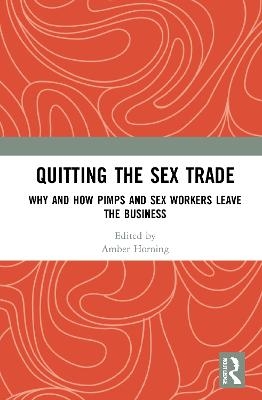
Quitting the Sex Trade
Routledge (Verlag)
978-0-367-69526-2 (ISBN)
This book provides insight into the meaning of this work; how people in the sex trade view their engagement in licit/illicit spheres; and it will inform providers who interface with people from these communities regarding how to support desistance. Further this book may help those engaged in emerging topics related to the sex trade, including: (1) global trends in sex trade decriminalization and/or human trafficking criminalization, (2) the recent emergence of human trafficking intervention courts in the USA, and (3) the development (and impact) of new laws, policies, and intervention programs designed to reduce human trafficking (globally, regionally, country level) and/or more localized efforts to support desistance among participants in the sex trade.
The book will be of interest to academics, researchers and advanced students of Criminology, Sociology, Law, Policy, and Psychology. It was originally published as a special issue in the journal Victims & Offenders.
Amber Horning is Assistant Professor in the School of Criminology and Justice Studies at the University of Massachusetts, Lowell. For the last decade, they have researched commercial sex markets and human trafficking. Dr Horning has led one of the largest studies on sex market facilitators in the United States.
Introduction: Quitting the Sex Trade: Keeping Narratives inside the Debates on Prostitution Policy and Legislation
Amber Horning
1. A Safe Harbor Is Temporary Shelter, Not A Pathway Forward: How Court-Mandated Sex Trafficking Intervention Fails to Help Girls Quit the Sex Trade
Misty Luminais, Rachel Lovell and Margaret McGuire
2. Harlem Pimps’ Reflections on Quitting: External and Internal Reasons
Amber Horning, Lyndsay Thompson and Christopher Thomas
3. The Recursive Relationship between Substance Abuse, Prostitution, and Incarceration: Voices from a Long-Term Cohort of Women
Ronet Bachman, Samantha Rodriguez, Erin M. Kerrison and Chrysanthi Leon
4. Uncovering Intentions to Exit Prostitution: Findings from a Qualitative Study
Andrea N. Cimino
5. "It’s like Being an Electrician, You’re Gonna Get Shocked": Differences in the Perceived Risks of Indoor and Outdoor Sex Work and Its Impact on Exiting
Kathleen Preble, Karen Magruder and Andrea N. Cimino
6. Self-Narratives of Persistent Pimps and Those Anticipating Desistance: Emotions, Conventional Work, and Moral Profitability Calculus
Loretta J. Stalans and Mary A. Finn
| Erscheinungsdatum | 24.02.2021 |
|---|---|
| Verlagsort | London |
| Sprache | englisch |
| Maße | 174 x 246 mm |
| Gewicht | 417 g |
| Themenwelt | Recht / Steuern ► EU / Internationales Recht |
| Recht / Steuern ► Strafrecht ► Kriminologie | |
| Recht / Steuern ► Strafrecht ► Strafverfahrensrecht | |
| Sozialwissenschaften ► Ethnologie | |
| Sozialwissenschaften ► Soziologie | |
| ISBN-10 | 0-367-69526-X / 036769526X |
| ISBN-13 | 978-0-367-69526-2 / 9780367695262 |
| Zustand | Neuware |
| Haben Sie eine Frage zum Produkt? |
aus dem Bereich


